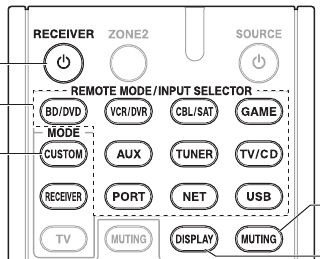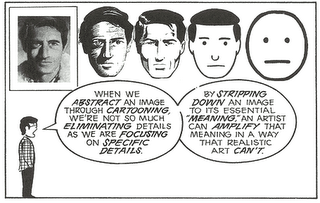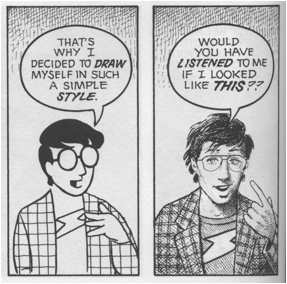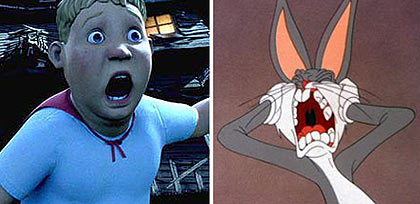Frank Zappa speaks to the Senate on the subject of labeling records for mature content, September 19, 1985. He doesn't really start in until about 3:30.
Mr. Zappa. My name is Frank Zappa. This is my attorney Larry Stein from Los Angeles. Can you hear me?
The Chairman. If you could speak very directly and clearly into the microphone, I would appreciate it.
Mr. Zappa. My name is Frank Zappa. This is my attorney Larry Stein.
The statement that I prepared, that I sent you 100 copies of, is five pages long, so I have shortened it down and am going to read a condensed version of it.
Certain things have happened. I have been listening to the event in the other room and have heard conflicting reports as to whether or not people in this committee want legislation. I understand that Mr. Hollings does from his comments. Is that correct?
The CHAIRMAN. I think you had better concentrate on your testimony, rather than asking questions.
Mr. ZAPPA. The reason I need to ask it, because I have to change something in my testimony if there is not a clearcut version of whether or not legislation is what is being discussed here.
The Chairman. Do the best you can, because I do not think anybody here can characterize Senator Hollings” position.
Mr. ZAPPA. I will carry on with the issue, then.
Senator Exon. Mr. Chairman, I might help him out just a little bit. I might make a statement. This is one Senator that might be interested in legislation and/or regulation to some extent, recognizing the problems with the right of free expression.
I have previously expressed views that I do not believe I should be telling other people what they have to listen to. I really believe that the suggestion made by the original panel was some kind of an arrangement for voluntarily policing this in the music industry as the correct way to go.
If it will help you out in your testimony, I might join Senator Hollings or others in some kind of legislation and/or regulation, unless the free enterprise system, both the producers and you as the performers, see fit to clean up your act.
Mr. ZAPPA. OK, thank you.
The First thing I would like to do, because I know there is some foreign press involved here and they might not understand what the issue is about, one of the things the issue is about is the First Amendment to the Constitution, and it is short and I would like to read it so they will understand. It says:
Congress shall make no law respecting an establishment of religion or prohibiting the free exercise thereof, or abridging the freedom of speech or of the press or the right of the people peaceably to assemble and to petition the government for a redress of grievances.
That is for reference.
These are my personal observations and opinions. They are addressed to the PMRC [Parents’ Music Resource Centre] as well as this committee. I speak on behalf of no group or professional organization.
The PMRC proposal is an ill-conceived piece of nonsense which fails to deliver any real benefits to children, infringes the civil liberties of people who are not children, and promises to keep the courts busy for years, dealing with the interpretational and enforcemental problems inherent in the proposal’s design.
It is my understanding that, in law, First Amendment Issues are decided with a preference for the least restrictive alternative. In this context, the PMRC’s demands are the equivalent of treating dandruff by decapitation.
No one has forced Mrs. Baker or Mrs. Gore to bring Prince or Sheena Easton into their homes. Thanks to the Constitution, they are free to buy other forms of music for their children. Apparently, they insist on purchasing the works of contemporary recording artists in order to support a personal illusion of aerobic sophistication. Ladies, please be advised: The $8.98 purchase price does not entitle you to a kiss on the foot from the composer or performer in exchange for a spin on the family Victrola. Taken as a whole, the complete list of PMRC demands reads like an instruction manual for some sinister kind of “toilet training program” to house-break all composers and performers because of the lyrics of a few. Ladies, how dare you?
The ladies’ shame must be shared by the bosses at the major labels who, through the RIAA, chose to bargain away the rights of composers, performers, and retailers in order to pass H.R. 2911, The Blank Tape Tax: A private tax levied by an industry on consumers for the benefit of a select group within that industry.
Is this a consumer issue? You bet it is. PMRC spokesperson, Kandy Stroud, announced to millions of fascinated viewers on last Friday’s ABC Nightline debate that Senator Gore, a man she described as “A friend of the music industry,” is co-sponsor of something she referred to as “anti-piracy legislation”. Is this the same tax bill with a nicer name?
The major record labels need to have H.R. 2911 whiz through a few committees before anybody smells a rat. One of them is chaired by Senator Thurmond. Is it a coincidence that Mrs. Thurmond is affiliated with the PMRC?
I cannot say she’s a member, because the PMRC has no members. Their secretary told me on the phone last Friday that the PMRC has no members, only founders. I asked how many other District of Columbia wives are nonmembers of an organization that raises money by mail, has a tax-exempt status, and seems intent on running the Constitution of the United States through the family paper-shredder. I asked her if it was a cult. Finally, she said she couldn’t give me an answer and that she had to call their lawyer.
While the wife of the Secretary of the Treasury recites “Gonna drive my love inside you” and Senator Gore’s wife talks about “Bondage!” and “oral sex at gunpoint” on the CBS Evening News, people in high places work on a tax bill that is so ridiculous, the only way to sneak it through is to keep the public’s mind on something else: “Porn rock”.
Is the basic issue morality? Is it mental health? Is it an issue at all? The PMRC has created a lot of confusion with improper comparisons between song lyrics, videos, record packaging, radio broadcasting, and live performances. These are all different mediums, and the people who work in them have the right to conduct their business without trade-restraining legislation, whipped up like an instant pudding by The Wives of Big Brother.
Is it proper that the husband of a PMRC nonmember/founder/person sits on any committee considering business pertaining to the Blank Tape Tax or his wife’s lobbying organization? Can any committee thus constituted “find facts” in a fair and unbiased manner? This committee has three that we know about: Senator Danforth, Senator Packwood, and Senator Gore. For some reason, they seem to feel there is no conflict of interest involved.
The PMRC promotes their program as a harmless type of consumer information service providing “guidelines” which will assist baffled parents in the determination of the “suitability” of records listened to by “very young children”. The methods they propose have several unfortunately [sic] side effects, not the least of which is the reduction of all American Music, recorded and live, to the intellectual level of a Saturday morning cartoon show.
Children in the vulnerable age bracket have a natural love for music. If, as a parent, you believe they should be exposed to something more uplifting than “Sugar Walls,” support Music Appreciation programs in schools. Why have you not considered your child’s need for consumer information? Music Appreciation costs very little compared to sports expenditures. Your children have a right to know that something besides pop music exists.
lt is unfortunate that the PMRC would rather dispense governmentally sanitized heavy metal music than something more uplifting. Is this an indication of PMRC’s personal taste, or just another manifestation of the low priority this administration has placed on education for the arts in America?
The answer, of course, is neither. You cannot distract people from thinking about an unfair tax by talking about Music Appreciation. For that you need sex, and lots of it.
The establishment of a rating system, voluntary or otherwise, opens the door to an endless parade of Moral Quality Control Programs based on “Things Certain Christians Don’t Like”. What if the next bunch of Washington Wives demands a large yellow “J” on all material written or performed by Jews, in order to save helpless children from exposure to concealed Zionist doctrine?
Record ratings are frequently compared to film ratings. Apart from the quantitative difference, there is another that is more important: People who act in films are hired to pretend. No matter how the film is rated, it won’t hurt them personally.
Since many musicians write and perform their own material and stand by it as their art (whether you like it or not), an imposed rating will stigmatize them as individuals. How long before composers and performers are told to wear a festive little PMRC arm band with their scarlet letter on it?
Bad facts make bad law, and people who write bad laws are, in my opinion, more dangerous than songwriters who celebrate sexuality. Freedom of Speech, Freedom of Religious Thought, and the Right to Due Process for composers, performers and retailers are imperiled if the PMRC and the major labels consummate this nasty bargain.
Are we expected to give up article 1 so the big guys can collect an extra dollar on every blank tape and 10 to 25% on tape recorders? What is going on here? Do we get to vote on this tax? Do we get to vote on this tax? I think that this whole matter has gotten completely blown out of proportion, and I agree with Senator Exon that there is a very dubious reason for having this event. I also agree with Senator Exon that you should not be wasting time on stuff like this, because from the beginning I have sensed that it is somebody’s hobby project.
Now, I have done a number of interviews on television. People keep saying, can you not take a few steps in their direction, can you not sympathize, can you not empathize? I do more than that at this point. I have got an idea for a way to stop all this stuff and a way to give parents what they really want, which is information, accurate information as to what is inside the album, without providing a stigma for the musicians who have played on the album or the people who sing it or the people who wrote it. And I think that if you listen carefully to this idea that it might just get by all of the constitutional problems and everything else.
As far as I am concerned, I have no objection to having all of the lyrics placed on the album routinely, all the time. But there is a little problem. Record companies do not own the right automatically to take these lyrics, because they are owned by a publishing company.
So, just as all the rest of the PMRC proposals would cost money, this would cost money too, because the record companies would need — they should not be forced to bear the cost, the extra expenditure to the publisher, to print those lyrics.
If you consider that the public needs to be warned about the contents of the records, what better way than to let them see exactly what the songs say? That way you do not have to put any kind of subjective rating on the record. You do not have to call it R, X, D/A, anything. You can read it for yourself.
But in order for it to work properly, the lyrics should be on a uniform kind of a sheet. Maybe even the Government could print those sheets. Maybe it should even be paid for by the Government, if the Government is interested in making sure that people have consumer information in this regard.
And you also have to realize that if a person buys the record and takes it out of the store, once it is out of the store you can’t return it if you read the lyrics at home and decide that little Johnny is not supposed to have it.
I think that that should at least be considered, and the idea of imposing these ratings on live concerts, on the albums, asking record companies to reevaluate or drop or violate contracts that they already have with artists should be thrown out.
That is all I have to say.
The Chairman. Thank you very much, Mr. Zappa. You understand that the previous witnesses were not asking for legislation. And I do not know, I cannot speak for Senator Hollings, but I think the prevailing view here is that nobody is asking for legislation.
The question is just focusing on what a lot of people perceive to be a problem, and you have indicated that you at least understand that there is another point of view. But there are people that think that parents should have some knowledge of what goes into their home.
Mr. ZAPPA. All along my objection has been with the tactics used by these people in order to achieve the goal. I just think the tactics have been really bad, and the whole premise of their proposal -- they were badly advised in terms of record business law, they were badly advised in terms of practicality. or they would have known that certain things do not work mechanically with what they suggest.
The CHAIRMAN. Senator Gore.
Senator GORE. Thank you very much, Mr. Chairman.
I found your statement very interesting and, although I disagree with some of the statements that you make and have made on other occasions, I have been a fan of your music, believe it or not. I respect you as a true original and a tremendously talented musician.
Your suggestion of printing the lyrics on the album is a very interesting one. The PMRC at one point said they would propose either a rating or warning, or printing all the lyrics on the album. The record companies came back and said they did not want to do that.
I think a lot of people agree with your suggestion that one easy way to solve this problem for parents would be to put the actual words there, so that parents could see them. In fact, the National Association of Broadcasters made exactly the same request of the record companies.
I think your suggestion is an intriguing one and might really be a solution for the problem.
Mr. ZAPPA. You have to understand that it does cost money, because you cannot expect publishers to automatically give up that right, which is a right for them. Somebody is going to have to reimburse the publishers, the record industry.
Without trying to mess up the album jacket art, it should be a sheet of paper that is slipped inside the shrink-wrap, so that when you take it out you can still have a complete album package. So there is going to be some extra cost for printing it.
But as long as people realize that for this kind of consumer safety you are going to spend some money and as long as you can find a way to pay for it, I think that would be the best way to let people know.
Senator GORE. I do not disagree with that at all. And the separate sheet would also solve the problem with cassettes as well, because you do not have the space for words on the cassette packs.
Mr. ZAPPA. There would have to be a little accordion-fold.
Senator GORE. I have listened to you a number of times on this issue, and I guess the statement that I want to get from you is whether or not you feel this concern is legitimate.
You feel very strongly about your position, and I understand that. You are very articulate and forceful.
But occasionally you give the impression that you think parents are just silly to be concerned at all.
Mr. ZAPPA. No; that is not an accurate impression.
Senator GORE. Well, please clarify it, then.
Mr. ZAPPA. First of all, I think it is the parents’ concern; it is not the Government’s concern.
Senator GORE. The PMRC agrees with you on that.
Mr. ZAPPA. Well. that does not come across in the way they have been speaking. The whole drift that I have gotten, based upon the media blitz that has attended the PMRC and its rise to infamy, is that they have a special plan, and it has smelled like legislation up until now.
There are too many things that look like hidden agendas involved with this. And I am a parent. I have got four children. Two of them are here. I want them to grow up in a country where they can think what they want to think, be what they want to be, and not what somebody’s wife or somebody in Government makes them be.
I do not want to have that and I do not think you do either.
Senator GORE. OK. But now you are back on the issue of Government involvement. Let me say briefly on this point that the PMRC says repeatedly no legislation, no regulation, no Governnient action. It certainly sounded clear to me.
And as far as a hidden agenda, I do not see one, hear one, or know of one.
Mr. ZAPPA. OK, let me tell you why I have drawn these conclusions. First of all, they may say, we are not interested in legislation. But there are others who are, and because of their project bad things have happened in this country in the industry.
I believe there is actually some liability. Look at this. You have a situation where, even if you go for the lyric printed thing in the record, because of the tendency among Americans to be copycats -- one guy commits a murder, you get a copycat murder-now you’ve got copycat censors.
You get a very bad situation in San Antonio, TX, right now where they are trying to pass PMRC-type individual ratings and attach them to live concerts, with the mayor down there trying to make a national reputation by putting San Antonio on the map as the first city in the United States to have these regulations, against the suggestion of the city attorney, who says, I do not think this is constitutional.
But you know, there is this fervor to get in and do even more and even more.
And the other thing, the PMRC starts off talking about lyrics, but when they take it over into other realms they start talking about the videos. In fact, you misspoke yourself at the beginning in your introduction when you were talking about the music does this, the music does that. There is a distinct difference between those notes and chords and the baseline [sic — error in Congressional report] and the rhythm that support the words and the lyrics.
I do not know whether you really are talking about controlling the type of music.
The CHAIRMAN. The lyrics.
Mr. ZAPPA. So specifically we are talking about lyrics. It began with lyrics. But even looking at the PMRC fundraising letter, in the last paragraph at the bottom of the page it starts looking like it is branching into other areas, when it says: “We realize that this material has pervaded other aspects of society.” And it is like what, you are going to fix it all for me?
Senator GORE. No. I think the PMRC’s acknowledging some of the statements by some of their critics who say: Well, why single out the music industry.
Do I understand that you do believe that there is a legitimate concern here?
Mr. ZAPPA. But the legitimate concern is a matter of taste for the individual parent and how much sexual information that parent wants to give their child, at what age, at what time, in what quantity, OK. And I think that, because there is a tendency in the United States to hide sex, which I think is an unhealthy thing to do. and many parents do not give their children good sexual education, in spite of the fact that little books for kids are available, and other parents demand that sexual education be taken out of school, it makes the child vulnerable, because if you do not have something rational to compare it to when you see or hear about something that is aberrated you do not perceive it as an aberration.
Senator GORE. OK, I have run out of time.
Thank vou, Mr. Chairman.
The CHAIRMAN. Senator Rockefeller.
Senator ROCKEFELLER. No questions, Mr. Chairnan.
The CHAIRMAN. Senator Gorton.
Senator GORTON. Mr. Zappa, I am astounded at the courtesy and soft-voiced nature of the comments of my friend, the Senator from Tennessee. I can only say that I found your statement to be boorish, incredibly and insensitively insulting to the people that were here previously; that you could manage to give the first amendment of the Constitution of the United States a bad name, if I felt that you had the slightest understanding of it, which I do not.
You do not have the slightest understanding of the difference between Government action and private action, and you have certainly destroyed any case you might otherwise have had with this Senator.
Thank you, Mr. Chairman.
Mr. ZAPPA. Is this private action?
The CHAIRMAN. Senator Exon.
Senator EXON. Mr. Chairman, thank you very much.
Mr. Zappa, let me say that I was surprised that Senator Gore knew and liked your music. I must confess that I have never heard any of your music, to my knowledge.
Mr. ZAPPA. I would be more than happy to recite my lyrics to you.
Senator EXON. Can we forgo that?
Senator GORE. You have probably never heard of the Mothers of Invention.
Senator EXON. I have heard of Glen Miller and Mitch Miller. Did you ever perform with them?
Mr. ZAPPA. As a matter of fact, I took music lessons in grade school from Mitch Miller’s brother.
Senator EXON. That is the first sign of hope we have had in this hearing.
Let us try and get down to a fundamental question here that I would like to ask you, Mr. Zappa. Do you believe that parents have the right and the obligation to mold the psychological development of their children?
Mr. ZAPPA. Yes, I think they have that right, and I also think they have that obligation.
Senator EXON. Do you see any extreme difficulty in carrying out those obligations for a parent by material falling into the hands of their children over which thely have little or no control?
Mr. ZAPPA. Well, one of the things that has been brought up before is talking about very young children getting access to the material that they have been showing here today. And what I have said to that in the past is a teenager may go into a record store unescorted with $8.98 in his pocket, but very young children do not.
If they go into a record store, the $8.98 is in mom or dad’s pocket, and they can always say, Johnny, buy a book. They can say, Johnny, buy instrumental music; there is some nice classical music for you here; why do you not listen to that.
The parent can ask or guide the child in another direction, away from Sheena Easton, Prince, or whoever else you have been complaining about. There is always that possibility.
Senator EXON. As I understand it from your testimony — and once again, I want to emphasize that I see nothing wrong whatsoever; in fact, I salute the ladies for bringing this to the attention of the public as best they see fit. I think you could tell from my testimony that I tend to agree with them.
I want to be very careful that we do not overstep our bounds and try and — and I emphasize once again — tell somebody else what they should see. I am primarily worried about children.
It seems to me from your statement that you have no obligation — or no objection whatsoever to printing lyrics, if that would be legally possible, or from a standpoint of having the room to do that, on records or tapes. Is that not what you said?
Mr. ZAPPA. I think it would be advisable for two reasons. One, it gives people one of the things that they have been asking for. It gives them that type of consumer protection because, if you can read the English language and you can see the lyrics on the back, you have no excuse for complaning if you take the record out of the store.
And also, I think that the record industry has been damaged and it has been given a very bad rap by this whole situation because it has been indicated, or people have attempted to indicate, that there is so much of this kind of material that people object to in the industry, that that is what the industry is.
It is not bad at all. Some of the albums that have been selected for abuse here are obscure. Some of them are already several years old. And I think that a lot of deep digging was done in order to come up with the song about anal vapors or whatever it was that they were talking about before.
Senator EXON. If I understand you, you would be in support of printing the lyrics, but you are adamantly opposed to any kind of a rating system?
Mr. ZAPPA. I am opposed to the rating system because, as I said, if you put a rating on the record it goes directly to the character of the person who made the record, whereas if you rate a film, a guy who is in the film has been hired as an actor. He is pretending. You rate the film, whatever it is, it does not hurt him.
But whether you like what is on the record or not, the guy who made it, that is his art and to stigmatize him is unfair.
Senator EXON. Well, likewise, if you are primarily concerned about the artists, is it not true that for many many years, we have had ratings of movies with indications as to the sexual content of movies and that has been, as near as I can tell, a voluntary action on the part of the actors in the movies and the producers of the movies and the distributors?
That seems to have worked reasonably well. What is wrong with that?
Mr. ZAPPA. Well, first of all, it replaced something that was far more restrictive, which was the Hayes Office. And as far as that being voluntary, there are people who wish they did not have to rate their films. They still object to rating their films, but the reason the ratings go on is because if they are not rated they will not get distributed or shown in theaters. So there is a little bit of pressure involved, but still there is no stigma.
Senator EXON. The Government does not require that. The point I am trying to make is — and while I think these hearings should not have been held if we are not considering legislation or regulations at this time, I emphasized earlier that they might follow.
I simply want to say to you that I suspect that, unless the industry “clears up their act” — and I use that in quotes again — there is likely to be legislation. And it seems to me that it would not be too far removed from reality or too offensive to anyone if you could follow the general guidelines, right, wrong, or indifferent, that are now in place with regard to the movie industry.
Mr. ZAPPA. Well, I would object to that. I think first of all, I believe it was you who asked the question of Mrs. Gore whether there was any other indication on the album as to the contents. And I would say that a buzzsaw blade between a guy’s legs on the album cover is a good indication that it is not for little Johnny.
Senator EXON. I do not believe I asked her that question, but the point you made is a good one, because if that should not go to little minds I think there should be at least some minimal activity or attempt on the part of the producers and distributors, and indeed possibly the performers, to see that that does not get to that little mind.
Mr. Chairman, thank you very much.
The CHAIRMAN. Senator Hollings.
Senator HOLLINGS. Mr. Zappa, I apologize for coming back in late, but I am just hearing the latter part of it. I hear that you say that perhaps we could print the words, and I think that is a good suggestion, but it is unfair to have albums rated.
Now, it is not considered unfair in the movie industry, and I want you to elaborate. I do not want to belabor you, but why is it unfair? I mean, it is accurate, is it not?
Mr. ZAPPA. Well, I do not know whether it is accurate, because sometimes they have trouble deciding how a film gets to be an X or an R or whatever. And you have two problems. One is the quantity of material, 325 films per year versus 25,000 4-minute songs per year, OK.
You also have a problem that an album is a compilation of different types of cuts. If one song on the album is sexually explicit and all the rest of it sounds like Pat Boone, what do you get on the album? How are you going to rate it?
There are little technical difficulties here, and and you have the problem of having somebody in the position of deciding what’s good, what’s bad, what’s talking about the devil, what is too violent, and the rest of that stuff.
But the point I made before is that when you rate the album you are rating the individual, because he takes personal responsibility for the music; and in the movies, the actors who are performing in the movie, it does not hurt them.
Senator HOLLINGS. Well, very good. I think the actual printing of the content itself is perhaps even better than the rating. Let everyone else decide.
Mr. ZAPPA. I think you should leave it up to the parents, because not all parents want to keep their children totally ignorant.
Senator HOLLINGS. Well, you and I would differ on what is ignorance and education, I can see that. But if it was there, they could see what they were buying and I think that is a step in the right direction.
As Senator Exon has pointed out, the primary movers in this particular regard are not looking for legislation or regulations, which is our function. To be perfectly candid with you, I would look for regulations or some kind of legislation, if it could be constitutionally accomplished, unless of course we have these initiatives from the industry itself.
I think your suggestion is a good one. If you print those words, that would go a long way toward satisfying everyone’s objections.
Mr. ZAPPA. All we have to do is find out how it is going to be paid for.
Senator HOLLINGS. Thank you, Mr. Chairman.
The CHAIRMAN. Senator Hawkins.
Senator HAWKINS. Mr. Zappa, you suy you have four children?
Mr. ZAPPA. Yes, four children.
Senator HAWKINS. Have you ever purchased toys for those children?
Mr. ZAPPA. No; my wife does.
Senator HAWKINS. Well, I might tell you that if you were to go in a toy store — which is very educational for fathers, by the way; it is not a maternal responsibility to buy toys for children — that you may look on the box and the box says, this is suitable for 5 to 7 years of age, or 8 to 15, or 15 and above, to give you some guidance for a toy for a child.
Do you object to that?
Mr. ZAPPA. In a way I do, because that means that somebody in an office someplace is making a decision about how smart my child is.
Senator HAWKINS. I would be interested to see what toys your kids ever had.
Mr. ZAPPA. Why would you be interested?
Senator HAWKINS. Just as a point of interest.
Mr. ZAPPA. Well, come on over to the house. I will show them to you.
Senator HAWKINS. I might do that.
Do you make a profit from sales of rock records?
Mr. ZAPPA. Yes.
Senator HAWKINS. So you do make a profit from the sales of rock records?
Mr. ZAPPA. Yes.
Senator HAWKINS. Thank you. I think that statement tells the story to this committee. Thank you.
The CHAIRMAN. Mr. Zappa, thank you very much for your testimony.
Mr. ZAPPA. Thank you.
I've read this a number of times throughout my life, and am always struck by just how intelligent it is. Zappa doesn't pull punches; he's biting and sarcastic -- but he also addresses the problem, the proposal, what's wrong with it, why music is distinct from film (over and over and over again, because the Senators clearly are not fucking listening to him), and a sensible alternative solution. He also lays out what he thinks the RIAA's ulterior motives might be, and makes an appeal for better music education in the bargain.
The Senators -- well, Gore comes off the best; a little on the obsequious side but reasonable and conciliatory.
Gorton (I loved him as the Riddler) comes off the worst; he contributes absolutely nothing to the debate and, as all reactionaries inevitably do, simply takes a moment to say something condescending to his obvious intellectual superior.
Exon -- who, as Zappa notes in the book, is not exactly the most liberal guy (and indeed would continue to push legislation for government censorship, sponsoring the Communications Decency Act of 1996) -- also comes across as fairly reasonable, agreeing with Frank's fundamental point that making the lyrics available to buyers is preferable to a ratings system.
Well, there was no legislation, and no ratings system.
But lyrics were never visibly included with albums either.
As "compromise" there was a voluntary, vague "PARENTAL ADVISORY: EXPLICIT LYRICS" sticker.
Eventually, physical media gave way to digital, and, thanks in large part to fans who just don't give a fuck about copyright, it is totally trivial to look up the lyrics to virtually any song.
But the argument persists, of course.
I headlined my first Zappa post "As True Now", and unfortunately time flows like a river and history repeats. Video games are the boogeyman now, and the same damn-fool arguments keep rearing their ugly heads: "Well, a child can just walk into a store and buy a copy of Grand Theft Auto!"
Though that's calmed down since Brown v EMA, where the Supreme Court soundly rejected the notion of government regulation of violent video games.
And here's the funny thing: the closest recent analogue I can think of to Zappa's Senate testimony...is the words of the Justices themselves in oral arguments.
Sotomayor referenced Bugs Bunny and Spock. Kagan mentioned that her clerks had grown up playing Mortal Kombat and seemed to have turned out all right. Scalia -- God. I am not president of Scalia's fan club, so it pains me to say he fucking hit it out of the park. Hell, he even used Zappa's response to that hypothetical I just mentioned:
Even Breyer's dissent was well-reasoned. He's got a point: it is absurd that the government can restrict the sale of magazines that show nipples but not video games that show decapitation. He and I are absolutely agreed on that point -- we just disagree on what conclusion it implies.
Basically, we've got eight Justices who made intelligent, insightful arguments in Brown v EMA, and one who appears prominently in a Google search for "Long Dong Silver".
Well, the fight continues and it'll continue through whatever the hell medium is the next boogeyman. And while it's sad that Zappa is no longer with us to argue eloquently for common sense, I think history shows that common sense always wins out in the end.
 From there I hooked up the rest of my various devices. The Onkyo remote has the now-typical problem of a shitload of different inputs with sometimes arbitrary names -- "GAME" works fine for the component switch connected to my Wii and PS2 (another aside: I wish the thing had more component inputs so I wouldn't need a component switch at all -- but obviously analog is on its way out and I'm sure in a few years I'll have enough HDMI devices that I will be grateful for the emphasis on the new input over the old), but, absent anything resembling "HTPC", I have my HTPC connected under "BD/DVD". My seldom-used DVD/VCR combo is under "VCR/DVR", and my TV audio is connected to "TV/CD", which inexplicably is not the same button as "TV"; the "TV" button can't actually be assigned to any audio input. (I guess people connecting the audio output of their TV into an input on the receiver are probably a rarity; most people have cable boxes which they can connect to the receiver and then output to the TV. But I don't have cable TV, and we sometimes watch broadcast TV. Such people do exist!)
From there I hooked up the rest of my various devices. The Onkyo remote has the now-typical problem of a shitload of different inputs with sometimes arbitrary names -- "GAME" works fine for the component switch connected to my Wii and PS2 (another aside: I wish the thing had more component inputs so I wouldn't need a component switch at all -- but obviously analog is on its way out and I'm sure in a few years I'll have enough HDMI devices that I will be grateful for the emphasis on the new input over the old), but, absent anything resembling "HTPC", I have my HTPC connected under "BD/DVD". My seldom-used DVD/VCR combo is under "VCR/DVR", and my TV audio is connected to "TV/CD", which inexplicably is not the same button as "TV"; the "TV" button can't actually be assigned to any audio input. (I guess people connecting the audio output of their TV into an input on the receiver are probably a rarity; most people have cable boxes which they can connect to the receiver and then output to the TV. But I don't have cable TV, and we sometimes watch broadcast TV. Such people do exist!)




